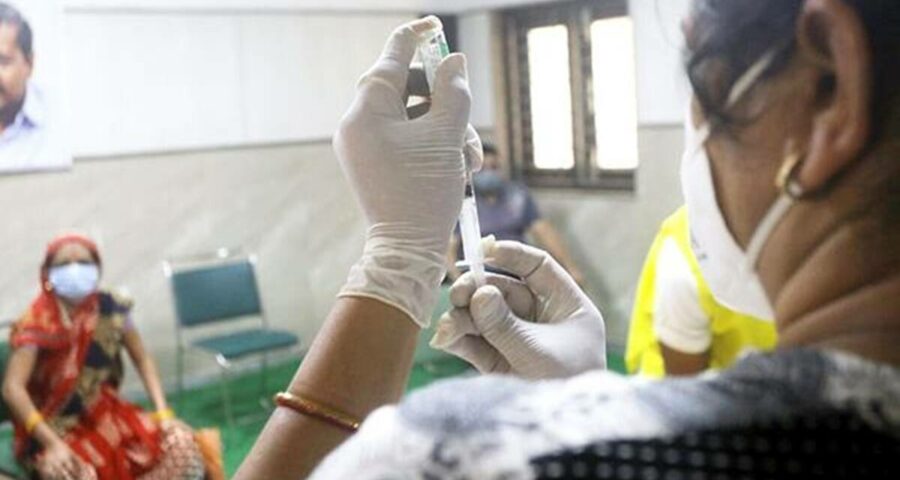India is also working with several other countries in the WTO on a targeted and temporary waiver under TRIPS to ensure timely and secure access to vaccines for all, the foreign secretary said.
Discussions are underway with major pharma companies about sourcing and possibly manufacturing their COVID-19 jabs locally while India is looking forward to WHO’s nod for Bharat Biotech’s indigenously developed vaccine, Foreign Secretary Harsh Vardhan Shringla said on Thursday.
Addressing the World Health Organisation’s South-East Asia Regional Health Partners’ Forum on COVID-19 he also said the government has worked with key partners to ease regulatory disruptions to vaccine supply chains through diplomatic interventions.
India is fighting an “exceptionally severe” second wave of the contagion and it will participate in the process of creating global scale capacities that are needed to deal with pandemic-scale challenges, Shringla said.
He said a number of serious global conversations are underway on this in platforms such as the G7, G20, QUAD, BRICS, the United Nations and WHO itself.
India is also working with several other countries in the WTO on a targeted and temporary waiver under TRIPS to ensure timely and secure access to vaccines for all, the foreign secretary said.
The country will participate fully in the international process of regeneration through building newer and more resilient supply chains by focusing on newer technologies, knowledge-driven opportunities and leveraging its strengths and capacities.
“We are also part of discussions with major vaccine manufacturers like Pfizer, Johnson and Johnson, and Moderna about sourcing and possible local manufacturing of their vaccines in India. We have also helped to expedite the introduction of the Sputnik-V vaccine.
“Vaccines have complex supply chains. We have worked to ease regulatory disruptions to these supply chains with key partners through diplomatic interventions. We are also looking forward to WHO’s approval for India’s indigenous vaccine made by Bharat Biotech,” Shringla said.
He said the COVID-19 pandemic is now well into its second year and India is fighting an “exceptionally severe” second wave.
“We have lived through a series of extraordinary stresses and shocks. We are dealing with unprecedented economic and social disruptions and distress.”
Challenges of nature like the coronavirus pandemic require a response at multiple levels. Nationally, it requires not just a whole-of-government approach but a whole-of-society approach. It also is required that solutions and capacities are sourced globally basis, he said.
WHO is one of the key constituents in a global array of players dealing with the pandemic, the foreign secretary stressed.
“At a strategic level, we have a keen awareness of the uncertainty that pervades the entire global system. This has altered geopolitical and geoeconomic conduct. Trust and transparency have been affected, there is heightened risk aversion and confidence in globalisation has been affected,” he said.
What is often termed as the “global system?, for lack of a better word, is seen as inadequate to the challenges posed by the pandemic, Shringla said, adding the new realities of the pandemic placed unprecedented demands on the Government of India, including the Ministry of External Affairs (MEA).
Elaborating the operations of the MEA during the second wave, he said India has acted as the global arm of the Government of India’s empowered group to procure essential raw materials and medical supplies for COVID-19.
“We had to create, literally overnight, new capacities to try and cope with a Black Swan event. We have had to innovate, to repurpose and to re-engineer and create an entirely new vertical for pandemic diplomacy,” Shringla said.
Throughout the pandemic, it has identified and connected with potential suppliers of essential medicines, raw materials and medical equipment across the world.
The MEA and its network of diplomatic posts played a key role in organising the Vande Bharat Mission, the largest logistical exercise of its kind ever undertaken. This has facilitated the movement of 7 million people through the lockdown and post-lockdown periods.
During the first Covid wave last year, a global sourcing operation was launched to procure ventilators, PPE kits, test kits and others. These helped India to tide over the situation till domestic manufacturing scaled up to meet the demand, Shringla said.
A total of 91 cargo flights were organised between April and August 2020 to bring in these supplies, he said.
“The effort to procure urgently needed medical supplies was reactivated during the second wave. We have been a vital part of a global effort to source liquid medical oxygen, cryogenic ISO tankers, zeolites and essential medicines like Remdesivir, Tocilizumab and Amphotericin B.
“These have been sourced from multiple nations and moved to multiple destinations in India,” Shringla said, adding the MEA will continue to facilitate supplies of essential raw materials and components.
Source: Read Full Article


